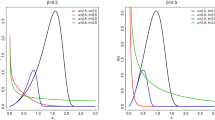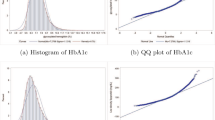Abstract
A marginal pairwise likelihood estimation approach is examined in the normal ogive model with binary response. This method, belonging to the broad class of composite likelihood, provides estimators with desirable asymptotic properties such as consistency and asymptotic normality. We study the performance of the proposed methodology by a simulation and we compare it with marginal maximum likelihood. The different results are also illustrated with an analysis of a real data set from a quality of life study.
Similar content being viewed by others
References
Albert, J.H.: Bayesian estimation of normal ogive item response curves using Gibbs sampling. J. Educ. Stat. 17, 251–269 (1992)
Baker, F.B., Kim, S.H.: Item Response Theory. Parameter Estimation Techniques. Marcel Dekker, New York (2004)
Bellio, R., Varin, C.: A pairwise likelihood approach to generalized linear models with crossed effects. Stat. Model. 5, 217–227 (2005)
Bergner, M., et al.: The sickness impact profile: validation of a health status measure. Med. Care 14, 56–67 (1973)
Besag, J.E.: Statistical analysis of non lattice data. Statistician 24(2), 179–195 (1975)
Birnbaum, A.: Some latent trait models and their use in inferring an examinees ability. In: Lord, F.M., Novick, M.R. (eds.) Statistical Theories of Mental Test Scores, pp. 395–479. Addison Wesley, Massachusetts (1960)
Cox, D.R., Reid, N.: A note on pseudolikelihood constructed from marginal densities. Biometrika 91, 729–737 (2004)
Fechner, G.T.: Elemente der Psychophysik. Breitkopf und Hartel, Leipzig (1960)
Feddag, M.L., Grama, I., Mesbah, M.: Generalized estimating equations for mixed logistic models. Commun. Stat.: Theory Methods 32(4), 851–874 (2003)
Feddag, M.L., Bacci, S.: Pairwise likelihood for the longitudinal mixed Rasch model. Comput. Stat. Data Anal. 53, 1027–1037 (2009)
Ferguson, G.A.: Item selection by the constant process. Psychometrika 7, 19–29 (1942)
Finney, D.J.: The application of probit analysis to the results on mental tests. Psychometrika 19, 31–39 (1944)
Fischer, G.H., Molenaar, I.W.: Rasch Models Foundations. Recents Developments and Applications. Springer-Verlag, Berlin (1995)
Kang, W., Lee, M.S., Lee, Y.: HGLM versus conditional estimators for the analysis of clustered binary data. Stat. Med. 24, 741–752 (2005)
Kuk, Y.C., Nott, D.N.: A pairwise likelihood approach to analyzing correlated binary data. Stat. Probab. Lett. 47, 329–335 (2000)
LeCessie, S., van Houwelingen, J.C.: Logistic regression for correlated binary data. Appl. Stat. 43, 95–108 (1994)
Lindsay, B.G.: Composite likelihood methods. In: Prablu, N.U. (ed.) Statistical Inference from Stochastic Processes Comtemporary Mathematics, vol. 80, pp. 221–239. American Mathematical Society, Providence (1988)
Lord, F.M.: A theory of test scores. Psychometric Monograph, No. 7 (1952)
Lord, F.M., Novick, M.R.: Statistical Theories of Mental Test Scores. Addison-Wesley Publishing Company, Reading (1968)
Muller, G.E.: Die Gesichtspunkte und die Tatsachen der psychophysischen Methodik. Bergmann, Wiesbaden (1904)
R Development Core Team: R: A Language and Environment for Statistical Computing. R Foundation for Statistical Computing, Vienna, Austria.ISBN (2005)
Renard, D., Geert, G., Geys, H.: A pairwise likelihood approach to estimation in multilevel probit models. Comput. Stat. Data Anal. 44, 649–667 (2004)
Richardson, M.W.: The relationship between difficulty and the differential validity of a test. Psychometrika 1(2), 33–49 (1936)
Rigdon, S.E., Tsutakawa, R.K.: Parameter estimation in latent trait models. Psychometrika 48, 567–574 (1983)
STATA base reference manual G-M release: A Stata Press Publication. STATA Corporation, College Station, Texas (2003)
Thomson, G.H.: A direct deduction of the constant process used in the method of right and wrong cases. Psychol. Rev. 26, 454–464 (1919)
Urban, F.M.: Die psychophysischen Massmethoden als Grundlagen empirisher Messungen. Archiv fur die gesamte Psychologie 15, 261–355 (1910a)
Urban, F.M.: Die psychophysischen Massmethoden als Grundlagen empirisher Messungen. Archiv fur die gesamte Psychologie 16, 168–227 (1910b)
van der Linden, W.J., Hambleton, R.K.: Handbook of Modern Item response Theory. Springer-Verlag, New York (1997)
Author information
Authors and Affiliations
Corresponding author
Rights and permissions
About this article
Cite this article
Feddag, ML. Pairwise likelihood estimation for the normal ogive model with binary data. AStA Adv Stat Anal 100, 223–237 (2016). https://doi.org/10.1007/s10182-015-0263-7
Received:
Accepted:
Published:
Issue Date:
DOI: https://doi.org/10.1007/s10182-015-0263-7




